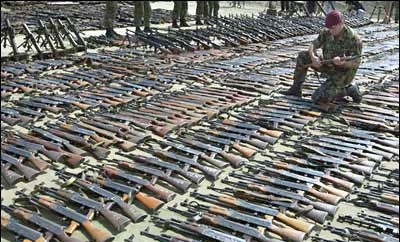Two thirds of the 1.8 million guns in Honduras are reportedly circulating illegally, with the country’s geography and high perceptions of insecurity fueling gun ownership.
According to newspaper La Tribuna, just 600,000 guns are legally registered, leaving 1.2 million guns in undocumented circulation. The total figure, if accurate, equates to nearly one gun for every four people in the country, with La Tribuna reporting their total estimated value to be $1.8 billion.
The provinces with the highest concentration of illegal arms are Cortes, Atlantida, Colon, Copan, and Francisco Morazan.
Former National Police Deputy Director Wilfredo Urtecho Jamborde said a key factor driving gun ownership was a popular perception that Honduran residents’ security needs were not being met.
The report comes almost a year after the Violence Observatory at the National Autonomous University of Honduras declared there were 500,000 registered guns in the country and one million circulating illegally. A previous report by the country’s National Commissioner for Human Rights (CONADEH) placed this number even lower, at around 850,000 total guns, with 258,000 registered.
InSight Crime Analysis
While it is unclear whether the disparity between La Tribuna’s figures and previously reported numbers are the result of a significant increase in guns circulating the country or methodological differences, all of the figures paint a grave picture of the illegal arms situation in Honduras.
With the United Nations Office on Drugs and Crime (UNODC) placing the homicide rate at 91.6 per 100,000 in its 2011 Global Study on Homicide, Honduras is widely considered the most dangerous country in the world outside of a warzone. Around 80 percent of all crimes are committed with unregistered guns.
SEE ALSO: Honduras News and Profiles
Despite recent talk of ramping up regulations, the country’s gun laws remain lax. Whether a change in the law would have the needed effect is a matter for debate, with evidence suggesting there is little clear correlation between lax gun laws and gun violence in Latin America. What remains clear is that without effective action to combat corruption and deep rooted criminal activity, the violence is unlikely to subside and it is doubtful the public will be willing to hand in their weapons regardless of any law being passed.

